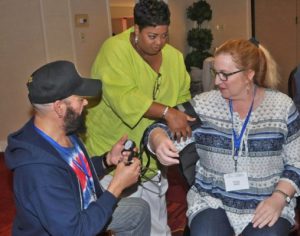
Participants attending Community Health Workers training sessions hone their clinical skills. Photo provided by Keith Nicholls.
As part of CRGC’s sub team focusing on
Community Action Planning & Resilience Building, Consortium researchers collaborated with local stakeholders to identify three communities that were especially hard-hit by the 2010 Deepwater Horizon oil spill and could benefit from the efforts of Community Health Workers (CHWs)- Also known as health advisors, advocates, auxiliaries, promoters, educators, and patient navigators.
To improve resilience in these communities-which included Bayou La Batre, AL, Galliano, LA, and Port Sulphur, LA-CRGC worked with its partners from the University of South Alabama’s Coastal Resource and Resiliency Center (CRRC) to train and deploy seven lay CHWs in community-based organizations and community health clinics in each of its target communities to improve overall health and healthcare capacity, enhance disaster preparedness, and support overall community resilience-building efforts.
Researchers evaluated training sessions for CHWs that included disaster-related components to provide improvements in their curricula. Feedback from participants and staff identified public health, cultural competency, community advocacy, and peer listening as the most useful training modules. Needs included more in-depth training in community resilience, environmental health, and in clinical skills, including chronic disease management.
The application of these insights can help better prepare community health workers who take active roles in disaster preparedness, response, and recovery. CRGC researchers,
Keith Nicholls, PhD,
Steven J. Picou, PhD, and
Selena C. McCord recently published these findings in the
Journal of Public Health Management and Practice: Training Community Health Workers to Enhance Disaster Resilience. Read more »
Learn more about how
CRGC’s research and outreach activities are not only informing and enabling the broadened accessibility of disaster resilience-building
resources, but also providing
targeted, customized decision-support tools for diverse stakeholder groups across the Gulf of Mexico region.

